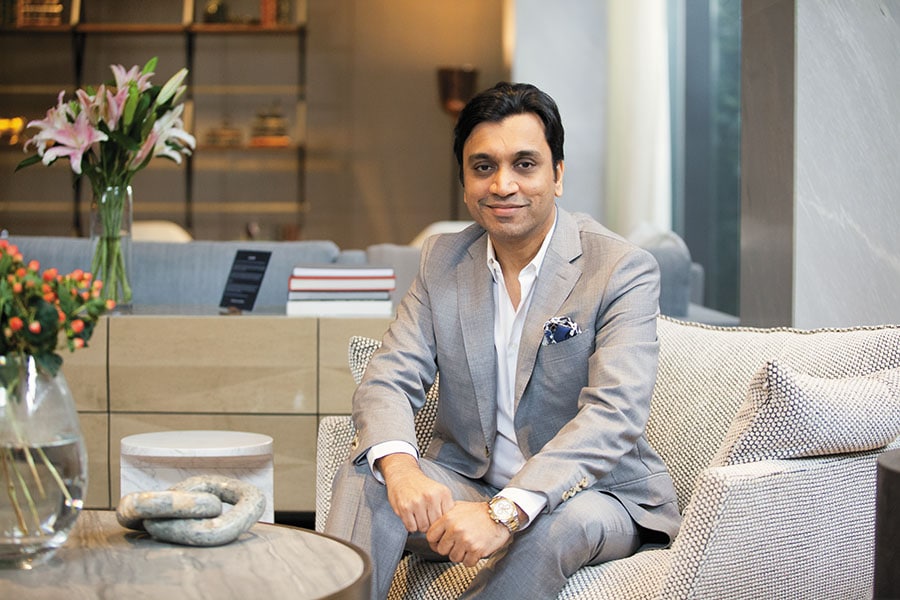
If you can hold the price for longer, you own the market: Adarsh Jatia
The CEO and MD of Provenance Land says patience is key when it comes to uber-luxury projects
 Image: Aditi Tailang
Image: Aditi TailangAdarsh Jatia, 37, CEO and MD of Provenance Land, a Mumbai-based realty developer that owns the Four Seasons Hotel in Worli, says patience is key for luxury real estate developers to sell marquee assets at the best price possible. It’s a philosophy that has held the Jatia family in good stead since the 1980s and helped them emerge as one of the largest pure-play developers of hotels in the country.
The three promoter families of the erstwhile Asian Hotels–Jatias, Sarafs and Guptas–developed premium hotels in New Delhi, Mumbai, Kolkata and Pune under the Hyatt Regency and Four Seasons brands. Through multiple business splits over the years, the ownership of these properties now rests with different factions. At present, Provenance owns the Four Seasons Hotel in Mumbai along with the 4.5 acre parcel of land on which the five-star property stands.
Jatia is now bringing his expertise of being a luxury hotelier to the residential and commercial real estate market. He is developing the remaining land in his possession in Worli to build the Four Seasons Private Residences (an under-construction 64-storey tower with around 35 to 38 super premium apartments priced between ₹30 crore and ₹100 crore) while a luxury commercial space is on the cards. Edited excerpts from an interview:
Q. Unlike other developers who start with residential and commercial real estate and then move to hotels, Provenance is going the other way round. Why?
We (the Jatia family) don’t consider ourselves as developers, but as hoteliers, and hoteliers build hotels. We were doing well, but growth is slow in this business. Hotel assets are capital intensive, cyclical and have a long gestation period. But if you can bring a high quality asset into the market and hold on, you can do well. So we thought why not bring these premium assets to the residential and commercial markets as well. I saw a niche in the market where people are scouting for super-luxury residential properties, but developers, who typically operate with a short-term mindset, weren’t developing such assets. If you look at New York, London or Dubai, they are filled with such quality residential assets; in India, nothing like this is available. We saw the gap in the market and thought of exploiting it.
Also, from a business perspective, it makes sense to have residential, hospitality and commercial projects as part of the same master plan to balance an annuity-based revenue model with outright sales (as in the case of residential assets). What we have in Worli is just the Four Seasons Hotel, which is a 2 lakh sq ft development, whereas we have a total development potential of 10 lakh sq ft.
Q. How much will you be investing to build the residences and commercial tower? How will you fund these investments?
The fresh investment we are making, other than the land that we already have, is about ₹1,500 crore. And if I were to include the value of the land, it is about ₹2,200 crore. For the residences, the investment, including the land value, is around ₹900 crore. We are raising equity as we speak. There is a lot of interest from marquee international investors. We are looking to raise ₹1,000 crore and sales from the residential tower will also throw back cash, which we will utilise to complete its construction.
Q. At a time when the residential market, especially the high-end segment, hasn’t been doing so well, what gives you the confidence that the Four Seasons residences will buck the trend?
Since managed, luxury residences is a relatively new concept in India, many people don’t understand what the brand comes with. There are three pillars on which our offering stands: Brand promise, service and management.
Brand promise comes right from the design, planning, spaces, architecture, the finishing and specifications. In case of services, if we are offering housekeeping, laundry, engineering or room service, we need to ensure it is delivered in 30 minutes. When it comes to management, there will be a residential manager of the level of a hotel general manager who will look after every aspect of the society–making sure the members meet, budgets are maintained etc.
Q. How many of the apartments have been sold and by when do you expect them all to be sold?
The apartments begin at ₹30 crore for the standard 3,500 sq ft, three-bedroom ones. We also have duplexes and triplexes, and the price goes all the way up to ₹100 crore. We haven’t priced the penthouses yet since we believe the best way would be to showcase them to potential buyers after they are ready. We brought the property into the market in February 2016 and have sold around 50 percent thus far. Our commitment is to deliver the ready-to-move-in apartments by 2020.
I am in no rush. If your business plan allows you to hold your price for a little bit of time, that’s when you own the market. If a developer wants to command a higher price, he needs to be patient. Moreover, in a small project like this, if I sell five to seven apartments, the percentage shoots up.
Q. Many hotel operators are distancing themselves from property ownership, whereas you continue to own real estate. Why?
For them (hotel operators), it makes sense to divest properties since management is their forte and they make a significant fee out of assets in which they haven’t invested anything. Asset ownership is a different business that needs a long gestation period and long-term strategy. We own the real estate and the appreciation that we get on the value of the land is enormous.
(This story appears in the 30 November, -0001 issue of Forbes India. To visit our Archives, click here.)




